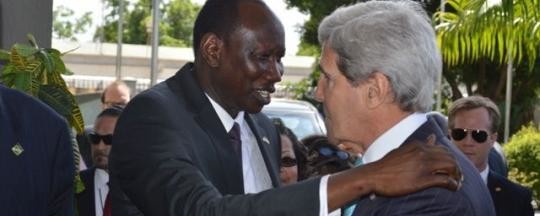The South Sudanese government has changed its policy to give its Interior Ministry control over issuance of visas for diplomats of the United States of America (USA) who apply to enter the country.
Reports of this first emerged last week after the SPLM-in-Opposition, a breakaway part of the ruling party now leading a rebellion, released a partially redacted email purporting to be a circular issued to all South Sudanese embassies, ordering them not to issue visas to diplomats of the United States, United Kingdom and Norway without approval of the Minister of Interior.
The three mentioned countries known as the ‘Troika’ had supported a resolution in the UN Security Council establishing a sanctions regime targeting South Sudanese who obstruct peace efforts. The resolution was harshly criticized by the South Sudanese government as unhelpful and unfair.
Foreign Minister Barnaba Marial Benjamin today confirmed to Radio Tamazuj that the Interior Ministry has now been given power to review visa applications for diplomats from the Troika countries, but he denied these countries alone were targeted and downplayed the change.
“The important people who have diplomatic passports must send their applications from the consulate to the Interior [Ministry],” he said in an interview. Barnaba claimed that this was a necessary step to improve coordination in order to properly receive visiting dignitaries.
But Barnaba confirmed that they will no longer allow diplomats to get visas on arrival at the airport.
“They were taking visas on arrival when the came to the airport. But that was causing us a lot of embarrassment. Sometimes if an envoy came [for example] and they didn’t get the president in the country or just a minister came to talk to him that would cause a big embarrassment therefore we changed it to do it like they do it in other countries.”
The foreign minister stressed, “There is no change in the relations between us.”
Radio Tamazuj asked the United States Embassy in South Sudan specifically whether they were informed of a directive that US diplomats can no longer obtain visas for entry into South Sudan without pre-approval by the Minister of Interior in Juba.
In an e-mailed response on 6 April the Embassy downplayed the change saying it was normal.
“The Embassy is aware that the Government of South Sudan has adjusted its processes for issuance of official and diplomatic visas for all international visitors. The implemented change is consistent with and conforms to international practice,” reads the response in full.
Kiir: ‘I cannot be threatened’
The policy change affecting foreign diplomats comes after President Salva Kiir and other officials responded defiantly to the American threat of sanctions.
Kiir said in a speech on 18 March, “The threats of sanctions were being waved in my eyes. They have a very funny language that they say, ‘There are people hanging up there with a stick.’ I told them, brother, that stick, let them hit in any place that they want to hit. If they want to hit the head let them hit, if they want to hit anywhere, then hit.”
“I cannot be threatened with that talk.”
Similarly, in a rally in Juba on 5 March against the US-backed Security Council resolution on sanctions, Assembly Speaker Manasseh Magok Rundial said, “If the khawajaat [‘whites’] agree that this country should be sanctioned, we are totally rejecting it… the threats of sanctions will never work, they encourage more war and bring no peace in the country.”
Minister of Information and Broadcasting Michael Makuei went further in remarks on 2 April referring sarcastically to Western nations as ‘our lords’ and slamming the country’s opposition leader who had advised a more conciliatory approach.
“The leader of opposition South Sudan… is warning us that why should we attack the Western world. He’s saying, ‘Don’t touch the Western world because they are our lords.’ Or what, why should we not touch them?” he said.
Makuei is the official spokesman of the government. He replaced Barnaba as information minister in July 2013, while Barnaba moved to the post of foreign minister. He has recently played a leading role in negotiations with Sudan and sat alongside Salva Kiir during the last unsuccessful round of peace talks in Addis Ababa last month.
File photo: South Sudan’s Minister in the Office of the President Awan Riak welcomes US Secretary of State John Kerry at Juba Airport, 2 May 2014 (Radio Tamazuj)




